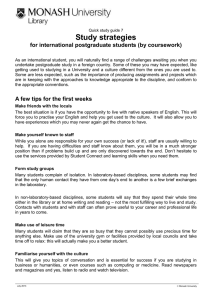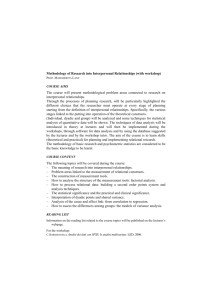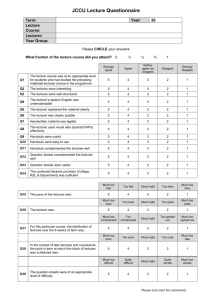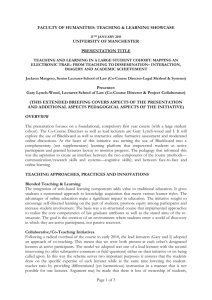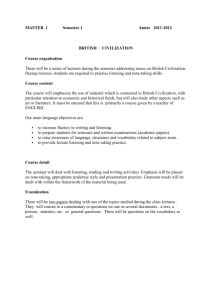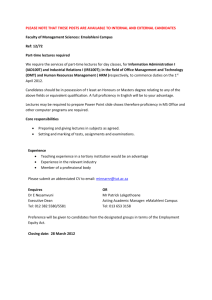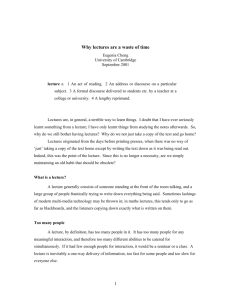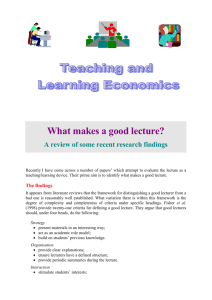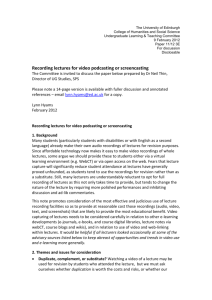Learning from lectures
advertisement
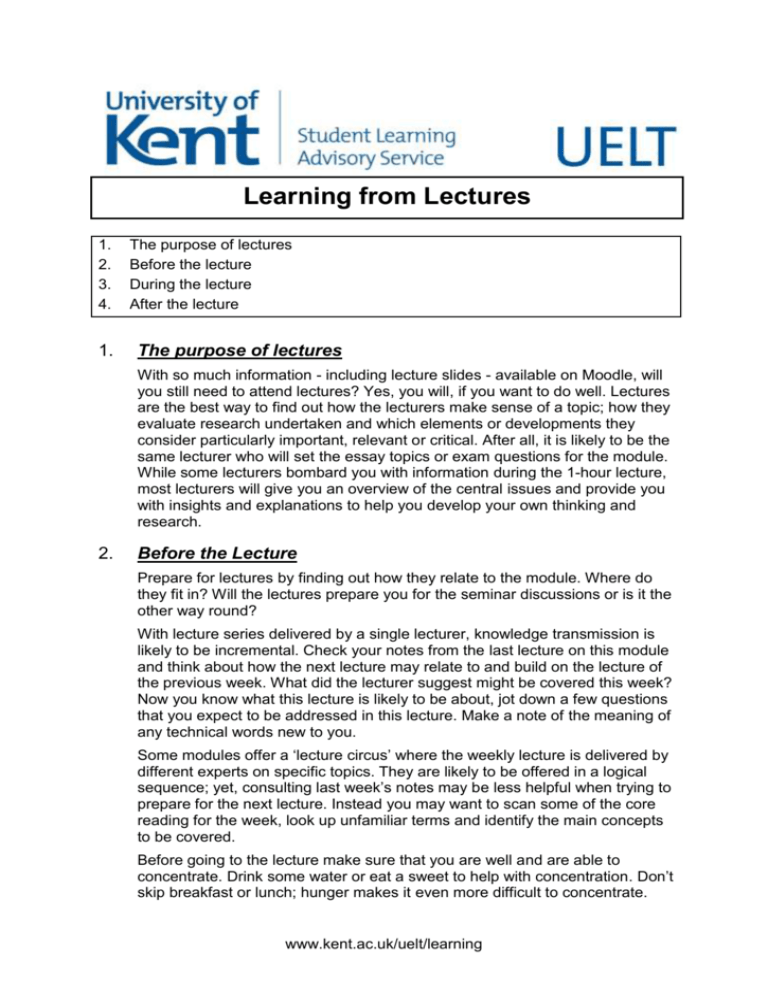
Learning from Lectures 1. 2. 3. 4. 1. The purpose of lectures Before the lecture During the lecture After the lecture The purpose of lectures With so much information - including lecture slides - available on Moodle, will you still need to attend lectures? Yes, you will, if you want to do well. Lectures are the best way to find out how the lecturers make sense of a topic; how they evaluate research undertaken and which elements or developments they consider particularly important, relevant or critical. After all, it is likely to be the same lecturer who will set the essay topics or exam questions for the module. While some lecturers bombard you with information during the 1-hour lecture, most lecturers will give you an overview of the central issues and provide you with insights and explanations to help you develop your own thinking and research. 2. Before the Lecture Prepare for lectures by finding out how they relate to the module. Where do they fit in? Will the lectures prepare you for the seminar discussions or is it the other way round? With lecture series delivered by a single lecturer, knowledge transmission is likely to be incremental. Check your notes from the last lecture on this module and think about how the next lecture may relate to and build on the lecture of the previous week. What did the lecturer suggest might be covered this week? Now you know what this lecture is likely to be about, jot down a few questions that you expect to be addressed in this lecture. Make a note of the meaning of any technical words new to you. Some modules offer a ‘lecture circus’ where the weekly lecture is delivered by different experts on specific topics. They are likely to be offered in a logical sequence; yet, consulting last week’s notes may be less helpful when trying to prepare for the next lecture. Instead you may want to scan some of the core reading for the week, look up unfamiliar terms and identify the main concepts to be covered. Before going to the lecture make sure that you are well and are able to concentrate. Drink some water or eat a sweet to help with concentration. Don’t skip breakfast or lunch; hunger makes it even more difficult to concentrate. www.kent.ac.uk/uelt/learning Try sitting in a different place in the lecture theatre - perhaps nearer the front than usual. This is likely to make you feel a bit uncomfortable - and so keep you more alert. 3. During the lecture Arriving promptly for a lecture has its advantages - lecturers often give out useful information or explain the structure of the lecture right at the beginning. For the same reason, don’t leave early. Aim to get the ‘grasp of the subject’ rather than to obtain a detailed ‘lecture script’. Note-taking is important but clearly not the main purpose of lectures. The amount of note-taking required depends on the lecture format. With lectures that aim to develop your understanding it is more important to listen than to take detailed notes. Instead make a note of key issues, concepts, ideas, theories, formulae etc. Also note down references and suggestions for further reading. If you are provided with hand-outs before the lecture, add your notes to them. For information-rich lectures it is important that you prepare in advance by browsing through textbooks and core texts. It is difficult to listen and take detailed notes at the same time and it is unlikely that you will leave the lecture with a set of complete notes. Consider recording the lecture as a backup; most lecturers are fine with this, nevertheless, ask for permission first. You may also find it helpful to pair up with someone else by forming a note-taking partnership to help you both get more from each lecture (see below). For advice and suggestions on how to take effective notes, see the SLAS key skills leaflet ‘Note Making’. 4. After the Lecture Ask for clarification While you are expected to listen only during the lecture, it is fine to ask questions after the lecture. If you are confident enough, ask in front of the whole class (many students will be thankful as they will have similar questions on their minds but are too shy to speak up). Alternatively, corner the lecturer before he or she leave the room. Asking for clarification not only helps you to understand the topic better, it also helps the lecturer to assess how much the students are able to understand and which concepts they tend to find difficult. Discuss your notes Get together with one or more students as soon as possible to review the lecture. Compare your notes and fill in any gaps. Check your understanding put your ideas together to get more out of the lecture. If there is some aspect that baffles all of you, decide what to do. Where can you find out more? What reading has been suggested? Is there a simpler text on this that will help? Work with your notes Instead of just filing your notes, work with them: regroup information, use colours and highlighters to identify key terms/points and make connections. www.kent.ac.uk/uelt/learning Fill in notes with examples, facts or case studies to make them constructive. Should you decide to rewrite some of them or even type them up, see if they could make more sense structured differently, e.g. have a box with main points at the top of the page. Listen to the recordings Should you have recorded the lecture, listen to them within the next 24 hours, maybe while commuting to and from campus. If you wait too long you will have hours of lectures to listen to which is unlikely to be productive. Label and save the recordings on your computer to help you with revision later. Develop your own thinking At the bottom of you notes you may want to jot down an action list. What do you need to do now to learn most effectively from this lecture? Work out when you will tackle the reading and other activities suggested by the lecturer. Lastly Store your notes in two safe places. Should you prefer to safe them electronically, make sure that you keep either a paper copy, a back-up copy on CD or USB stick or file a back up version on the Kent network (bodiam drive) in case there is a problem with your PC or laptop. www.kent.ac.uk/uelt/learning
